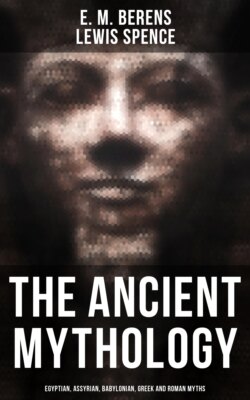Читать книгу The Ancient Mythology: Egyptian, Assyrian, Babylonian, Greek and Roman Myths - Lewis Spence - Страница 25
На сайте Литреса книга снята с продажи.
The Tower of Babel
ОглавлениеMany attempts have been made to attach the legend of the confusion of tongues to certain ruined towers in Babylonia, especially to that of E-Sagila, the great temple of Merodach, and some remarks upon this most interesting tale may not be out of place at this point. The myth is not found in Babylonia itself, and in its best form may be discovered in Scripture. In the Bible story we are told that every region was of one tongue and mode of speech. As men journeyed westward from their original home in the East, they encountered a plain in the land of Shinar where they settled. In this region they commenced building operations, constructed a city, and laid the foundations of a tower, the summit of which they hoped would reach to heaven itself. It would appear that this edifice was constructed with the object of serving as a great landmark to the people so that they should not be scattered over the face of the earth, and the Lord came down to view the city and the tower, and he considered that as they were all of one language this gave them undue power, and that what they imagined to themselves under such conditions they would be able to achieve. So the Lord scattered them abroad from thence over the face of every region, and the building of the tower ceased and the name of it was called 'Babel,' because at that place the single language of the people was confounded. Of course it is merely the native name of Babylon, which translated means 'gate of the god,' and has no such etymology as the Scriptures pretend,—the Hebrews confusing their verb balal 'to confuse or confound,' with the word babel. The story was no doubt suggested by one of the temple towers of Babylon. Over and over again we find in connexion with the Jewish religion that anything which savours of presumption or unnatural aspiration is strongly condemned. The ambitious effort of the Tower of Babel would thus seem abhorrent to the Hebrews of old. The strange thing is that these ancient towers or zikkurats, as the Babylonians called them, were intended to serve as a link between heaven and earth, just as does the minaret of the Mahommedan mosque.
Birs Nimrûd, the Tower of Babel From Nippur, or Exploration and Adventure on the Euphrates
The legend of the confusion of tongues is to be traced in other folk-lores than that of Babylon. It is found in Central America, where the story runs that Xelhua, one of the seven giants rescued from the deluge, built the great pyramid of Cholula in order to besiege heaven. The structure was, however, destroyed by the gods, who cast down fire upon it and confounded the language of its builders. Livingstone found some such myth among the African tribes around Lake Ngami, and certain Australian and Mongolian peoples possess a similar tradition.
